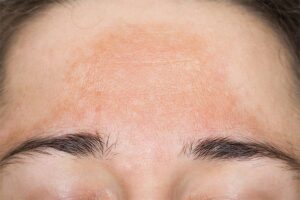Polycystic Ovary Syndrome (PCOS) is a complex hormonal disorder affecting millions of women worldwide. One of the lesser-known yet persistent side effects of PCOS is hyperpigmentation, a condition characterized by the darkening of certain areas of the skin. In this detailed blog, we will explore various treatment methods for PCOS hyperpigmentation, shedding light on each approach to help individuals journey to clearer and healthier skin.
Contents
Understanding PCOS and Hyperpigmentation

While PCOS is primarily known for its impact on reproductive health, it can also have noticeable effects on the skin, with one common concern being hyperpigmentation.
PCOS and Hormonal Imbalances
The underlying cause of PCOS is hormonal imbalance, specifically involving androgens, which are male hormones like testosterone. In individuals with PCOS, the ovaries produce higher-than-normal levels of androgens, disrupting the normal menstrual cycle and contributing to the formation of ovarian cysts. This hormonal imbalance can manifest in various ways, including changes in skin health.
Hyperpigmentation and Its Causes
Hyperpigmentation refers to the darkening of certain areas of the skin due to an overproduction of melanin, the pigment responsible for skin color. While exposure to sunlight is a common cause of hyperpigmentation, hormonal fluctuations, as seen in PCOS, can also play a significant role.
Different PCOS Hyperpigmentation Treatment Methods
Managing PCOS-related hyperpigmentation involves a multifaceted approach that may include lifestyle changes, topical treatments, and in some cases, invasive procedures. Let’s explore different treatment methods in detail:
Topical Treatments:
- Skin Lightening Agents: Skin-lightening agents such as hydroquinone, kojic acid, and alpha arbutin are commonly used to reduce hyperpigmentation. These ingredients work by inhibiting melanin production, the pigment responsible for skin color. However, long-term use of hydroquinone may have side effects, and alternatives like natural extracts are gaining popularity.
- Retinoids: Retinoids, derived from vitamin A, are potent agents in skin cell turnover. Tretinoin and adapalene are examples of retinoids that promote the shedding of old, pigmented skin cells, leading to the emergence of new, lighter skin. Regular use can gradually fade hyperpigmented areas, but caution is advised, as retinoids may cause skin sensitivity.
- Vitamin C: Vitamin C is renowned for its antioxidant properties and its ability to inhibit melanin production. Incorporating vitamin C serums or creams into the skincare routine can aid in reducing hyperpigmentation. Additionally, vitamin C helps in collagen synthesis, contributing to overall skin health.
- Licorice Extract: Licorice extract contains glabridin, which inhibits pigmentation and has anti-inflammatory properties. Applying products with licorice extract can be an effective strategy for managing PCOS-related hyperpigmentation.
- Niacinamide: Niacinamide, a form of vitamin B3, has demonstrated its effectiveness in reducing hyperpigmentation and improving skin texture. It works by inhibiting the transfer of pigment within the skin cells, leading to a more even skin tone.
Invasive Procedures
- Chemical Peels: Chemical peels involve the application of a chemical solution to the skin, causing controlled exfoliation. This process removes the outer layer of pigmented skin, revealing lighter and fresher skin underneath. Chemical peels can be tailored to various strengths, with superficial peels requiring minimal downtime.
- Microdermabrasion: Microdermabrasion employs a mechanical exfoliation technique, usually using a device with abrasive crystals or a diamond-tipped wand. This process removes the top layer of skin, diminishing hyperpigmentation. While less invasive than some other procedures, multiple sessions may be required for optimal results.
- Laser Therapy: Laser treatments target melanin in the skin, breaking it down and promoting collagen production. Intense Pulsed Light (IPL) and Fractional Laser are common options. Laser therapy can effectively treat hyperpigmentation, but it may require downtime, and individuals with darker skin tones should approach this option cautiously.
- Microneedling: Microneedling involves creating tiny punctures in the skin using a device with fine needles. This stimulates collagen production and aids in the absorption of topical treatments. Microneedling can improve hyperpigmentation and enhance overall skin texture.
- Cryotherapy: Cryotherapy involves freezing the hyperpigmented areas with liquid nitrogen, causing the darkened skin to peel off. While it can be effective, there is a risk of scarring and changes in pigmentation. Therefore, it’s essential to weigh the benefits and risks before opting for cryotherapy.
Lifestyle and Dietary Approaches

- Balanced Diet: A balanced diet rich in antioxidants, vitamins, and minerals is essential for skin health. Including foods like fruits, vegetables, and whole grains can provide the nutrients necessary for skin repair and regeneration.
- Hydration: Adequate hydration is crucial for skin hydration and overall health. Drinking enough water helps flush out toxins and supports the skin’s natural healing processes.
- Exercise: Regular physical activity improves blood circulation, promoting oxygen and nutrient delivery to the skin. Exercise also helps in managing insulin resistance, a common concern in PCOS.
- Stress Management: Chronic stress can exacerbate hormonal imbalances. Incorporating stress management techniques such as meditation, yoga, or deep breathing exercises can positively impact both hormonal health and skin condition.
- Supplements: Certain supplements, such as omega-3 fatty acids, zinc, and vitamins, may complement PCOS hyperpigmentation treatment. However, it’s crucial to consult with a healthcare professional before adding supplements to the regimen.
Hormonal Therapies
- Oral Contraceptives: Combining estrogen and progestin, oral contraceptives regulate hormonal imbalances, potentially improving skin conditions associated with PCOS, including hyperpigmentation.
- Anti-Androgen Medications: Drugs like spironolactone can be prescribed to reduce androgen levels, addressing the root cause of hyperpigmentation.
Natural Remedies
- Aloe Vera: Known for its soothing properties, aloe vera may help reduce inflammation and promote healing, potentially aiding in the improvement of hyperpigmentation.
- Turmeric: Contains curcumin, which has anti-inflammatory and antioxidant properties. Applying turmeric topically or consuming it may contribute to managing hyperpigmentation.
- Green Tea Extract: Rich in antioxidants, green tea extract may have skin-lightening effects. Some individuals find success in using green tea-infused products or applying cooled green tea bags to affected areas.
Prescription Medications
Corticosteroids: In certain cases, dermatologists may prescribe topical corticosteroids to reduce inflammation and lighten hyperpigmented areas.
Tranexamic Acid: Oral or topical use of tranexamic acid may be recommended to inhibit melanin production, contributing to the improvement of hyperpigmentation.
Herbal Treatments
- Licorice Root: Apart from licorice extract in skincare products, licorice root supplements may be considered for their potential skin-lightening effects.
- Ginseng: Ginsenosides in ginseng exhibit anti-inflammatory and antioxidant properties, which might contribute to managing hyperpigmentation when used topically.
Combination Therapies
- Customized Skincare Regimens: Dermatologists may create personalized skincare routines combining various products to address hyperpigmentation, considering individual skin types and sensitivities.
- Sequential Therapy: Sequentially combining different treatments, such as alternating between chemical peels and laser therapy, may offer enhanced results for some individuals.
DIY Masks and Treatments:
- Papaya Mask: Papaya contains enzymes that may exfoliate and lighten the skin. Applying a papaya mask can be a natural approach to managing hyperpigmentation.
- Yogurt and Honey Mix: Yogurt’s lactic acid combined with honey’s antibacterial properties can create a soothing mask with potential skin-brightening effects.
Sun Protection
- Sunscreen: Essential for preventing further hyperpigmentation, a broad-spectrum sunscreen with a high SPF should be a daily part of the skincare routine.
Which PCOS Hyperpigmentation Treatment Method To Choose?

Choosing the most suitable PCOS hyperpigmentation treatment method involves considering various factors, including the severity of hyperpigmentation, individual skin type, lifestyle, and personal preferences.
Consulting with healthcare professionals or dermatologists is crucial for a personalized assessment and tailored recommendations. However, here are some general guidelines to help navigate the decision-making process:
Consultation with Healthcare Professionals:
- Dermatologist: Seek advice from a dermatologist specializing in skin conditions. They can assess the severity of hyperpigmentation, identify underlying causes, and recommend appropriate treatments.
- Endocrinologist or Gynecologist: Given that PCOS is a hormonal disorder, consulting with an endocrinologist or gynecologist can address hormonal imbalances, contributing to more comprehensive management.
Consider the Severity of Hyperpigmentation:
Mild to Moderate Cases:
- Topical treatments, such as skin-lightening agents (hydroquinone, kojic acid) or retinoids, may be suitable for managing mild to moderate hyperpigmentation.
- Natural remedies, like aloe vera or turmeric, might be considered, along with lifestyle changes.
Severe Cases:
- Invasive procedures like chemical peels, laser therapy, or microneedling may be recommended for more severe hyperpigmentation.
- Combination therapies, involving multiple approaches, could provide enhanced results.
Budget and Accessibility:
- Certain prescription medications or professional procedures may have associated costs. Consider budgetary constraints and the availability of treatments in your region.
The ideal PCOS hyperpigmentation treatment method is highly individualized. A collaborative approach with healthcare professionals ensures that the chosen methods align with your specific needs and address the underlying causes of hyperpigmentation associated with PCOS.
Conclusion
In conclusion, managing hyperpigmentation associated with Polycystic Ovary Syndrome (PCOS) is a nuanced process that requires a comprehensive and individualized approach. Recognizing the intricate relationship between hormonal imbalances and skin health is crucial for making informed decisions about treatment.
Consulting with healthcare professionals, particularly dermatologists, and specialists in hormonal disorders, plays a pivotal role in crafting a tailored plan that addresses the unique circumstances of each individual.
If you are facing PCOS-related issues, PCOS treatment at HerMantra can help. Book your free trial online Pcos treatment session now.


